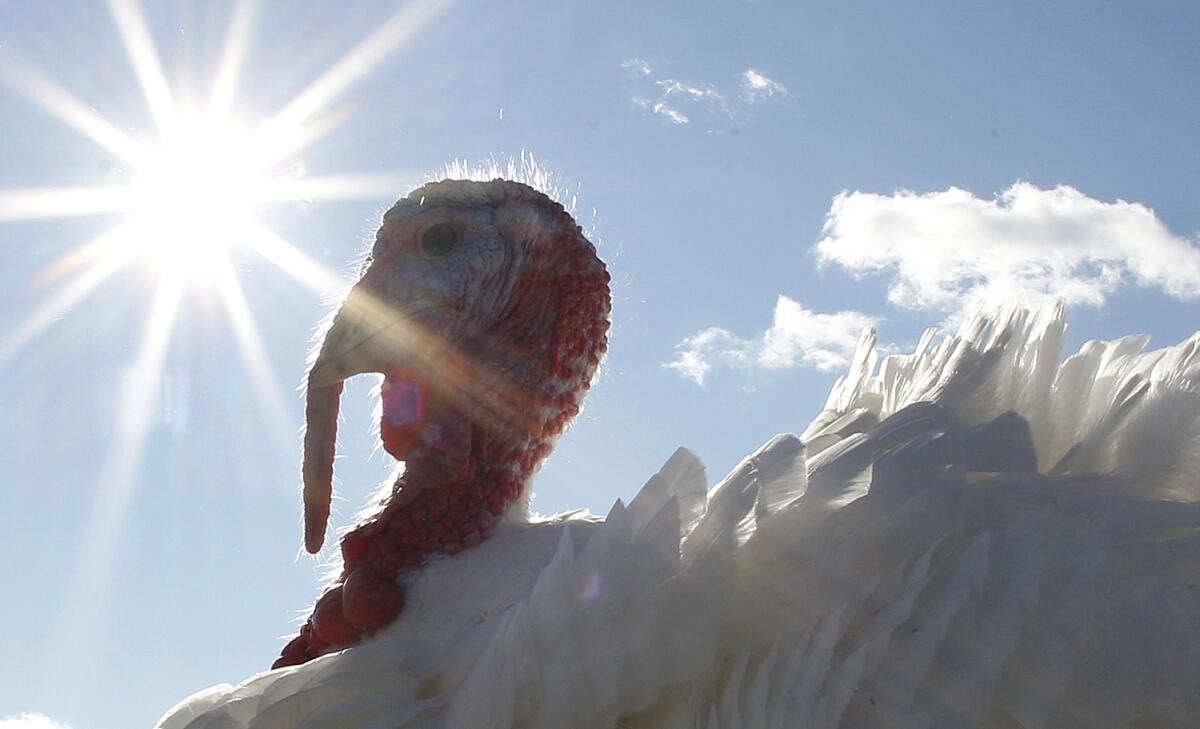Let’s talk turkey (not politics)

- Share via
It’s intriguing to consider those memories of childhood that are seemingly random, yet remain vivid and meaningful long into adulthood.
I don’t mean our recollections of milestone events: weddings, births, funerals, graduations. It’s little wonder that I can conjure the scene of Dad returned from Mom’s side at the hospital, breaking the news of the latest sibling to be born. Or the time Mom came home from the hospital, her maternity blouse indicating her advanced pregnancy and her eyes glassy, to tell me that Dad had died. That was a gorgeous April morning. I remember because the weather felt like a taunt to 11-year-old me; it should have been black and stormy.
Opinion Columnist
Jackie Calmes
Jackie Calmes brings a critical eye to the national political scene. She has decades of experience covering the White House and Congress.
No, the enduring memories I’m referring to are those that attach and persist for no apparent reason, the things that simply “make an impression,” as the apt saying goes. One such memory in particular returns to me often around Thanksgiving Day. It’s the admonition I heard more than once from great-aunts or -uncles at large family gatherings, delivered with utter seriousness but perhaps a hint of teasing for the little girl before them: “There are two things you don’t discuss in big groups,” they’d tell me. “Politics and religion.”
I don’t recall that they explained their purported words of wisdom, or that I asked. But I thought a lot about it. I figured the adults’ advice mainly reflected that we were Catholics in a community of mostly Protestants, many of whom apparently thought that we Catholics and our rituals were weird, even subversive.
My awareness of anti-Catholic animus came from an earlier random memory, one that was likely my introduction to politics: As a 5-year-old, I’d once crouched out of sight of some adult relatives gathered around a table, eavesdropping as they bellyached about how the Democratic presidential nominee, John F. Kennedy, probably would lose simply because he was a Catholic. And Irish, like most of us. The German descendants in the family had their own cause to be wary of politics: They spoke of anti-German sentiment so deep in Ohio during World War I that the state outlawed the teaching of the language.
Not all the relatives in the extended family were Democrats. There were Republicans among the mostly older folks who remained on the farms and in the small towns of northwest Ohio after World War II. But many in their children’s generation, including my parents, had come to the big city of Toledo and tended to vote for Democrats. That split, along with our faith, probably explained the family rule against talking politics.
I certainly ended up breaking that rule. I’ve made my living talking to people about politics, religion and anything else that explained their opinions about our messy democracy.
Such talk sometimes invited unpleasantness of the kind my elders sought to avoid. During my first job at a West Texas newspaper, I was wrapping up an interview when the man said he’d like to fix me up with his son. The man suggested that perhaps we all could go to church together. “Where do you worship?” he asked. Turned out it was a litmus test. When he learned I was Catholic, he awkwardly ended that line of conversation, noting that the only Catholics he knew were “the Mezcans.”
Mostly, however, I loved the license that journalism gave me to be a busybody, asking the very sort of personal questions I’d been warned against. I didn’t want to take sides; I wanted to understand how and why people came to believe what they do, and to share that insight with readers and viewers.
Politics ain’t beanbag, as the saying goes, and yet no matter how divisive the subject, for years my discussions with politicians and voters from all points of the spectrum were enjoyable and instructive. Correspondence from critics was generally civil.
That began to change back in the ’90s, amid Republican Newt Gingrich’s rise to power in Congress, the birth of Fox News, the expansion of talk radio and the polarization of our politics.
Increasingly it seemed that politics was all that many people wanted to talk about, and religion too, but with less civility, more hostility. Social media amped things up. Donald Trump turbocharged the trend with his questioning of President Obama’s U.S. birth, his call for banning Muslims and much more once he became president.
I came to enjoy my communications with readers a bit less as more of the missives to me were profane; I once gave the Secret Service a letter that had been left on my porch because it was so threatening to Obama (and me). I avoided open talk of politics at family and social gatherings. Before a niece’s wedding in October 2016, some of us women, including our matriarch, huddled surreptitiously in a bedroom to discuss the newly released video of Trump’s vulgar, misogynistic exchange with former “Access Hollywood” host Billy Bush. We didn’t want to get into an argument with our Trump-supporting relatives, mostly the men, and spoil the occasion.
The nation’s divisions have only gotten worse after four years of Trump’s presidency and a year of his lies about his loss. When members of a family find themselves on opposites sides, conversation about politics shouldn’t be served up at the holiday table. My grandparents’ generation had it right, I’m sad to say. Avoid the subject if it will prove at all unappetizing.
Savor the good stuff.
More to Read
A cure for the common opinion
Get thought-provoking perspectives with our weekly newsletter.
You may occasionally receive promotional content from the Los Angeles Times.











